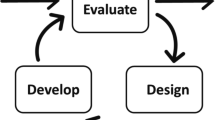Abstract
E-learning enables learners to decide what to learn, when, how and how fast. In the blended e-learning paradigm, knowledge is delivered using a combination of online and traditional distant education practices. The purpose of this paper is to propose a set of criteria for the evaluation of the educational process in blended e-learning communities. The systematic surveying and evaluation of the various parameters that affect the educational outcome is the primary aim of the quality assurance process. Existing evaluation methods provide general guidelines, which fail to cover the traditional distant education procedures (e.g. educational material, sporadic face-to-face meetings) that accompany e-learning activities. The key reason for the success of a blended e-learning approach is the balance between computer based and face-to-face interactions and the harmonic merge of the two. First, we review the current quality evaluation models for education and focus on the criteria that apply to blended e-learning approaches. Then, we discuss the issues arising from the combination of the two alternatives and propose solutions for improving the quality of the whole process.
Access this chapter
Tax calculation will be finalised at checkout
Purchases are for personal use only
Preview
Unable to display preview. Download preview PDF.
Similar content being viewed by others
References
Araújo, L.H.L., Lucena Filho, G.J., Losada, M.: Evaluating Virtual Learning Communities using a Nonlinear Model. In: Proc. of the 8th lasted CATE, Aruba (2005)
Athanasiou, G., Maris, N., Apostolakis, I.: Evaluation of virtual learning communities for supporting e-learning in healthcare domain. In: Proc. of 6th ICICTH, Greece (2008)
Bacsich, P.: Benchmarks for e-learning in UK HE - adaptation of existing good practice. In: Proc of the 12th ATL-C 2005, UK (2005)
Bajcsy, J.: Basic Information about Engineering Subject for Virtual Education. In: Proceedings of the 5th International Conference on Virtual University, Bratislava (2004)
Bielawski, L., Metcalf, D.: Blended eLearning: Integrating Knowledge, Performance Support, and Online Learning. Enterprise-class Edition, 2nd edn. HRD Press (2005)
Britain, S., Liber, O.: A Framework for Pedagogical Evaluation of Virtual Learning Environments. Report 41, JISC Technology Application Programme. Wales (1999)
Cobb, S.V.G., Neale, H.R., Reynolds, H.: Evaluation of virtual learning environments. In: Proc. of ECDVRAT, Skovde, Sweden, pp. 17–23 (1998)
Deepwell, F.: Embedding Quality in e-learning Implementation through Evaluation. Educational Technology & Society 10(2), 34–43 (2007)
Díaz, L.A., Figaredo, D.: Combined evaluation of on-line learning communities. In: Proc of ICTE 2009: International Conference on Technology and Education, France (2009)
Garrison, D., Kanuka, H.: Blended learning: Uncovering its transformative potential in higher education. The Internet and Higher Education 7(2), 95–105 (2004)
Holst, S.: Evaluation of Collaborative Virtual Learning Environments: The State of the Art. In: Scheuermann, F. (ed.) Proceedings of GMW (2000), ISBN 3-89325-925-2
Keller, J.: Motivational design of instruction. In: Reigeluth, C.M. (ed.) Instructional Design Theories and Models: An overview of their current status. Erlbaum, Hillsdale (1983)
Khan, B.: E-Learning Quick Checklist. IGI Publishing (2005), ISBN-10: 1591408121
Kirkpatrick, D.L.: Evaluating Training Programs: The Four Levels. Berrett-Koehler, San Francisco (1994)
de Kock, A., Sleegers, P., Voeten, M.: New Learning and the Classification of Learning Environments in Secondary Education. Review of Educational Research 74(2) (2004)
Marshall, S.J., Mitchell, G.: Benchmarking International E-learning Capability with the E-Learning Maturity Model. In: Proceedings of EDUCAUSE, Australia (2007)
Mayes, J.: Quality in the e-university. Assessment & Evaluation in Higher Education 26(5), 465–473 (2001)
Morton, S., Michael, S.: The Corporation of the 1990s: Information Technology and Organizational Transformation. Oxford University Press, New York (1991)
Smith, B.L.L., MacGregor, J.: Learning communities and the quest for quality. Quality Assurance in Education 17(2), 118–139 (2009)
Author information
Authors and Affiliations
Editor information
Editors and Affiliations
Rights and permissions
Copyright information
© 2010 Springer-Verlag Berlin Heidelberg
About this paper
Cite this paper
Varlamis, I., Apostolakis, I. (2010). A Framework for the Quality Assurance of Blended E-Learning Communities. In: Setchi, R., Jordanov, I., Howlett, R.J., Jain, L.C. (eds) Knowledge-Based and Intelligent Information and Engineering Systems. KES 2010. Lecture Notes in Computer Science(), vol 6278. Springer, Berlin, Heidelberg. https://doi.org/10.1007/978-3-642-15393-8_4
Download citation
DOI: https://doi.org/10.1007/978-3-642-15393-8_4
Publisher Name: Springer, Berlin, Heidelberg
Print ISBN: 978-3-642-15392-1
Online ISBN: 978-3-642-15393-8
eBook Packages: Computer ScienceComputer Science (R0)




